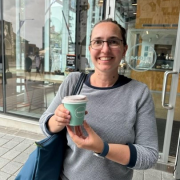Integrated Planning and Digital Twins in Healthcare Logistics

Speaker: Dr.-Ing. Melanie Reuter-Oppermann
Abstract: In a hospital, all departments are connected, and every logistical decision can impact others. Efficient and high-quality service requires the necessary resources such as personnel and beds to be dimensioned correctly and to be available in the right place at the right time. Typically, resource-related planning problems are treated separately for each resource without integrated planning across several resources, leading to sub-optimal solutions. Optimisation approaches can support decision making in healthcare practice, reduce the workload for clinical staff and decision makers and improve different objectives including efficiency, staff or patient satisfaction, quality of care or costs. Due to the complexity, it is not possible though to build mathematical optimisation models that address all aspects simultaneously. In addition, some decisions must be made onsite and in real-time. Simulation models can help with online decision making as well as analysing the potential consequences when transferring solutions from mathematical models into practice. With the support of the Julius von Haast Fellowship from the Royal Society of New Zealand, we aim to design an integrated simulation framework to model a complete hospital allowing to investigate all interdependencies and improvement potentials and to analyse the benefit of integrated planning.
A hospital-wide simulation model is a first step towards a digital twin of a hospital. While different forms of digital twins exist in the literature, we focus on those of healthcare facilities, services or processes that have operations research and mainly simulation models in their core, using a (constant) flow of real-time data, support decision making in real-time and offer the possibility to analyse the effects of decisions and potential scenarios. Despite the growing numbers of publications and review papers on the topic, the extent to which working digital twins have been developed and tested or even integrated in healthcare practice is still unclear. Therefore, we have performed a structured literature review and conclude that while several digital twins have been developed, hardly any have been implemented in practice.
Short Bio: Melanie is currently a Senior Research Fellow at Maastricht University and a Habilitation candidate at Technical University Darmstadt. She received her PhD in Operations Research from the Karlsruhe Institute of Technology, where she was also actively involved in the Karlsruhe Service Research Institute. She is a joint coordinator of the EURO working group ORAHS and speaker of the scientific advisory board of the DGRe. Her main research interests are OR and IS for emergency services/logistics and crisis management, as well as other areas in healthcare, e.g. hospital logistics, blood logistics or primary care.

